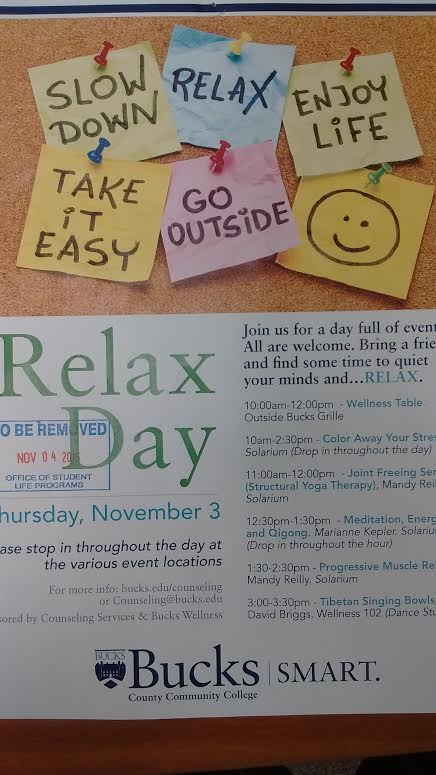Relax yourself this upcoming Thursday, Nov. 3 at the Bucks Newtown Campus for their educational and enriching Relax Day event, where Counseling Services is offering various activities throughout the day for students.
“Stress can impact your mind, body, soul and your academic success. Join us throughout the day for relaxing exercises, meditation, massage, healthy eating tips and more,” the Counseling Services portion of bucks.edu states.
What exactly is stress? The Mayo Clinic defines stress as “a normal psychological and physical reaction to the ever-increasing demands of life.”
They break it down by explaining how the brain comes with a “hard-wired alarm system,” that, when threatened, signals your body to release a burst of hormones to allow you to respond in a moment’s notice. This is also known as the “fight-or-flight” response.
Once the threat has disappeared, “your body is meant to return to a normal relaxed state.” Considering the amount of stress typically experience in day to day activities, this alarm system rarely shuts itself off.
College life can be very stressful for many students. According to the 2015 National College Health Assessment, stress was the highest percentage out of a list of 31 different factors that students felt affected their personal performance. Almost 86 percent of students polled that they felt stressed by all they had to do within those past 12 months.
Stress can affect many different areas of your life. The Counseling and Wellness Center at the University of Florida lists on their website a multitude of physical, emotional, and cognitive symptoms that relate to stress. Some of which include fatigue, headaches, difficulty sleeping, depression, anxiety, and difficulty concentrating. The list goes on and on.
Ignoring the issue of stress can cause a variety of symptoms that can affect you and your body tremendously. WebMD warns of the long term side effects of stress, ranging from breaking down your immune system to serious heart complications, and more.
The bright side of all of this is that stress is manageable. Just as there are many side effects to ignoring stress, there are also many combative techniques to ensure your mental and physical well-being are not greatly affected by it.
The American Psychological Association lists five different techniques that psychological research has shown to reduce stress, both short and long term. These include taking a break from the stressor (even just for a short period of time), exercise, gaining social support, meditation, and believe it or not, smiling and laughing have been proven to release tension which relieves stress.
There are countless different methods that are working to release stress in students today. Learning better time-management skills and setting realistic, goal-oriented objectives for yourself can be enormously effective for college students. It can even be as simple as making sure you practice proper sleeping habits.
More information on the event is available at bucks.edu/counseling. You can also reach them by phone at (215)-968-8189. Or just come out to the Bucks campus and relax!
Educate yourself on what stress is and what works best for you to combat it. You could not only improve your quality of life, but you could even be saving it.


